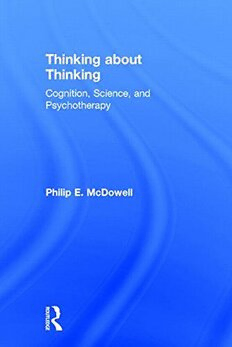Table Of ContentTHINKING ABOUT THINKING
This book examines cognition with a broad and comprehensive approach. Draw-
ing upon the work of many researchers, McDowell applies current scientific
thinking to enhance the understanding of psychotherapy and other contemporary
topics, including economics and health care. Through the use of practical exam-
ples, his analysis is accessible to a wide range of readers. In particular, clinicians,
physicians, and mental health professionals will learn more about the thought
processes through which they and their patients assess information.
Philip E. McDowell, LCSW, has a private practice in Lowville, New York. He
earned a Lifetime Achievement Award from the New York State Office of Mental
Health in 2002.
This page intentionally left blank
THINKING ABOUT
THINKING
Cognition, Science, and
Psychotherapy
Philip E. McDowell
First published 2015
by Routledge
711 Third Avenue, New York, NY 10017
and by Routledge
27 Church Road, Hove, East Sussex BN3 2FA
Routledge is an imprint of the Taylor & Francis Group, an informa business
© 2015 Taylor & Francis
The right of Philip E. McDowell to be identified as author of this work
has been asserted by him in accordance with sections 77 and 78 of the
Copyright, Designs and Patents Act 1988.
All rights reserved. No part of this book may be reprinted or reproduced or
utilised in any form or by any electronic, mechanical, or other means, now
known or hereafter invented, including photocopying and recording, or in
any information storage or retrieval system, without permission in writing
from the publishers.
Trademark notice : Product or corporate names may be trademarks or
registered trademarks, and are used only for identification and explanation
without intent to infringe.
Library of Congress Cataloging-in-Publication Data
McDowell, Philip E., author.
Thinking about thinking : cognition, science, and psychotherapy /
Philip E. McDowell.
p. ; cm.
Includes bibliographical references and index.
I. Title.
[DNLM: 1. Mental Processes—physiology. 2. Brain—
physiology. 3. Cognition. 4. Psychotherapy. WL 337]
QP360.5
612.8′233—dc23
2014030932
ISBN: 978-1-138-82396-9 (hbk)
ISBN: 978-1-138-82397-6 (pbk)
ISBN: 978-1-315-74175-8 (ebk)
Typeset in Bembo
by Apex CoVantage, LLC
After great inference, I came to the conclusion that I hadn’t the foggiest idea what
cognition was.
—Richard Powers
Galatea 2.2
It’s disorienting to grasp that the world itself is neutral and that all the familiarity and
unfamiliarity I feel is being carried around in my head.
—Verlyn Klinkenborg
New York Times
June 3, 2009
We humans can tolerate suffering but we cannot tolerate meaninglessness.
—Archbishop Desmond Tutu
Sensation tells us a thing is.
Thinking tells us what it is this thing is.
Feeling tells us what this thing is to us.
—Carl Gustav Jung
Figures 1.1, 1.3, 2.2 and 2.6: Katherine McDowell Patterson
Figures 4.5, 4.6 and 4.7: from On the Origin of the Human Mind by Dr. Andrey
Vyshedskiy. Published by MobileReference. Copyrights MobileReference and
Dr. Andrey Vyshedskiy
Figure 4.1: adapted from How the Mind Works, Steven Pinker, Penguin Press, 1997,
page 87.
Figures 4.2 and 4.3: adapted from How the Mind Works, Steven Pinker, Penguin
Press, 1997, page 103.
CONTENTS
List of Illustrations viii
Introduction ix
1 Thinking about Psychology 1
2 Thinking about the Brain 42
3 Thinking about Emotions 68
4 Thinking about Thinking 90
5 Thinking about Our Selves 141
6 Thinking about Science and Contemporary Issues 174
7 Re-Thinking Psychotherapy 221
Bibliography 245
Index 255
ILLUSTRATIONS
1.1 Human Eye 22
1.2 Ponzo Illusion 23
1.3 Human Ear 24
2.1 Gross Brain Organization 45
2.2 Neuron 47
2.3 Brain Lobes 49
2.4 Brodmann’s Areas 50
2.5 Association Areas 50
2.6 Synapse 58
4.1 Knowledge Representation of “Cat” 95
4.2 Computer Model of “Cat” and “Squirrel” 97
4.3 Neural Model of “Cat” and “Squirrel” 98
4.4 Visual Illusion/Ambiguity 99
4.5 Triangular Representation of a Neuronal Ensemble 116
4.6 Pyramid Model of a Neuronal Ensemble 117
4.7 Polyhedron Model of a Neuronal Ensemble 117
5.1 Drawing by Adult Survivor of Childhood Abuse: Initial
Presentation 158
5.2 Drawing by Adult Survivor of Childhood Abuse: Early
in Therapy 159
5.3 Drawing by Adult Survivor of Childhood Abuse: After
Therapeutic Rapport Is Established 159
6.1 Utility and Prospect Theories Psychological Model 180
INTRODUCTION
I have been a practicing psychotherapist for over 40 years. The essence of
psychotherapy—the art and science of using (primarily) verbal communication,
which is one expression of cognition, to address problems of thinking, feeling, and
behaving—is thinking about thinking.
I received my graduate training in psychotherapy at the University of Michigan
in the 1960s. The knowledge and skills I acquired were labeled s ocial casework. The
practice of psychotherapy was limited to psychiatrists and a small group of others
who had undergone training at a recognized psychoanalytic institute in keeping
with the teachings of Sigmund Freud and his followers. Since then, there has been a
proliferation of research in the psychological and neurological sciences, due in part
to new technologies and increased funding. The resulting findings have profound
implications for the practice of psychotherapy, yet I am struck by the apparently
immense gap between research and practice. This book is my modest attempt to
bridge that gap.
This book is not designed to be a complete exploration of the subject. My
intended audience includes psychotherapists; students of neuroscience, philosophy,
psychology, and psychotherapy; and general readers who desire a better grasp of
how we try to understand ourselves and the environments in which we function. I
have provided references in the manner accepted by scientific publications, as well
as recommendations for further reading, in the bibliography. I also recommend
that anyone interested in the latest thinking about psychology and neuroscience
become a subscriber to S cientific American Mind magazine.
An early scientific principle entitled Occam’s razor suggests that given alterna-
tive explanations we should choose the simplest until the more complex provides
more compelling evidence—a historical rendition of the modern acronym KISS:
Keep It Simple, Stupid. This parsimony is congruent with my Scottish heritage, so

